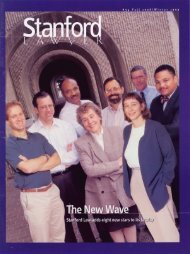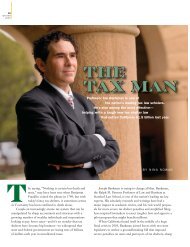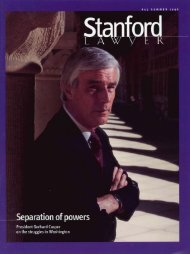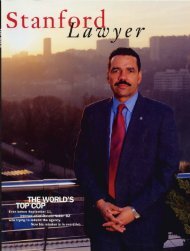Fall 1996 – Issue 50 - Stanford Lawyer - Stanford University
Fall 1996 – Issue 50 - Stanford Lawyer - Stanford University
Fall 1996 – Issue 50 - Stanford Lawyer - Stanford University
Create successful ePaper yourself
Turn your PDF publications into a flip-book with our unique Google optimized e-Paper software.
the environment and resulting global<br />
and regional instability.<br />
As the flagship institution of<br />
American foreign policy, the State<br />
Department must spearhead a government-wide<br />
effort to meet these<br />
environmental challenges. Together<br />
with other government agencies,<br />
we are pursuing our environmental<br />
priorities-globally, regionally,<br />
bilaterally, and in partnership with<br />
business and nongovernmental<br />
organizations. Each of these four<br />
dimensions is essential to the success<br />
of our overall strategy.<br />
GLOBAL AGENDA<br />
First, our approach to these problems<br />
must be global because pollution<br />
respects no boundaries, and<br />
the growing demand for finite resources<br />
in any part of the world<br />
inevitably puts pressure on the<br />
resources in all others.<br />
Across the United States,<br />
Americans suffer the consequences<br />
of damage to the environment far<br />
beyond our borders. Greenhouse<br />
gases released around the globe by<br />
power plants, automobiles, and<br />
burning forests affect our health<br />
and our climate, potentially causing<br />
many billions of dollars in damage<br />
from rising sea levels and changing<br />
storm patterns. Dangerous chemicals<br />
that are banned here but still<br />
used elsewhere travel long distances<br />
through the air and water.<br />
Overfishing of the world's oceans<br />
has put thousands of Americans out<br />
of work. A foreign policy that fails<br />
to address such problems would be<br />
ignoring the needs of the American<br />
people.<br />
Each nation must take steps on<br />
its own to combat these environmental<br />
threats, but we will not succeed<br />
until we can effectively fight<br />
them together. That realization<br />
inspired the pathbreaking efforts of<br />
the United Nations at the Stockholm<br />
Conference on the Human<br />
Environment 25 years ago, and at<br />
the historic Rio Summit on Environment<br />
and Development four<br />
years ago. There, the international<br />
community forged a new global<br />
commitment to "preserve, protect<br />
and restore ... the Earth's ecosystem"<br />
and to promote economic<br />
development in ways that also preserve<br />
our natural resources.<br />
Since Rio, the United States has<br />
intensified our global efforts. We<br />
led the way to an agreement to<br />
phase out the remaining substances<br />
that damage the ozone layer, to ban<br />
"PITTING<br />
ECONOMIC<br />
GROWTH AGAINST<br />
ENVIRONMENTAL<br />
PROTECTION IS...<br />
A FALSE CHOICE"<br />
the ocean dumping of low-level<br />
radioactive waste, and to achieve a<br />
new consensus in Cairo on stabilizing<br />
global population growth.<br />
We are working to reform and<br />
strengthen the UN's key environmental<br />
and sustainable-development<br />
programs. We have joined<br />
forces with the World Bank to incorporate<br />
sound environmental<br />
policies in lending programs, and to<br />
fund projects through the Global<br />
Environment Facility that directly<br />
benefit our health and prosperity.<br />
And we are striving through the<br />
new World Trade Organization to<br />
reconcile the complex tensions<br />
between promoting trade and protecting<br />
the environment-and to<br />
ensure that neither comes at the<br />
expense of the other.<br />
This year, we will begin negotiating<br />
agreements with the potential<br />
to make 1997 the most important<br />
year for the global environment<br />
since the Rio Summit. We will seek<br />
agreement on further cuts in greenhouse<br />
gases to minimize the effects<br />
of climate change. We will help lead<br />
an international process to address<br />
the problems caused by toxic chemicals<br />
that can seep into our land<br />
and water, poisoning them for generations.<br />
We will develop a strategy<br />
for the sustainable management of<br />
the world's forests-a resource that<br />
every great civilization has discovered<br />
is "indispensable for carrying<br />
on life," as the Roman historian<br />
Pliny once wrote. We will work<br />
with Congress to ratify the<br />
Biodiversity Convention, which<br />
holds benefits for American agriculture<br />
and business. We will also seek<br />
ratification of the Law of the Sea<br />
Treaty, which safeguards our access<br />
to ocean resources. We will provide<br />
the leadership needed to ensure that<br />
this June's UN Summit in Istanbul<br />
effectively confronts the pressing<br />
problems associated with the explosive<br />
growth of cities in the developing<br />
world.<br />
Finally, by the end of 1997, the<br />
State Department will host a conference<br />
on strategies to improve our<br />
compliance with international environmental<br />
agreements-to ensure<br />
that those agreements yield lasting<br />
results, not just promises.<br />
This is a daunting global agenda.<br />
Achieving these goals will take<br />
time and perseverance. But I often<br />
remember [former <strong>Stanford</strong> president]<br />
Don Kennedy's advice to<br />
graduates to set a "standard higher<br />
than you can comfortably reach."<br />
REGIONAL STRATEGIES<br />
The second element of our strategy-the<br />
regional element-is to<br />
confront pollution and the scarcity<br />
of resources in key areas where they<br />
dramatically increase tensions within<br />
and among nations. Nowhere is<br />
this more evident than in the<br />
parched valleys of the Middle East,<br />
where the struggle for water has a<br />
8 STANFORD LAWYER FALL <strong>1996</strong>
















